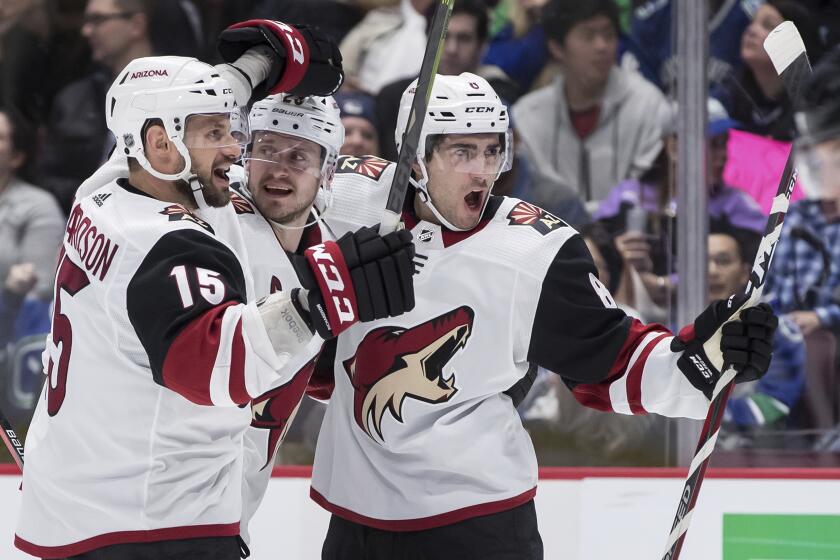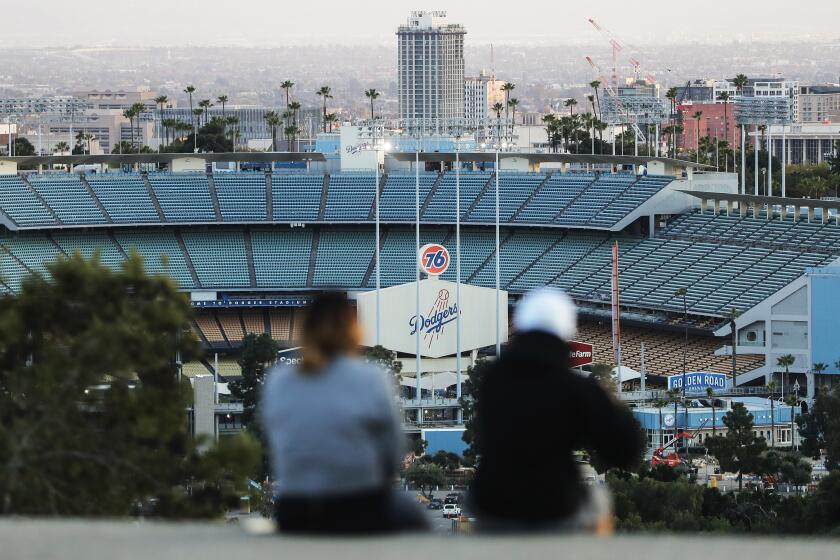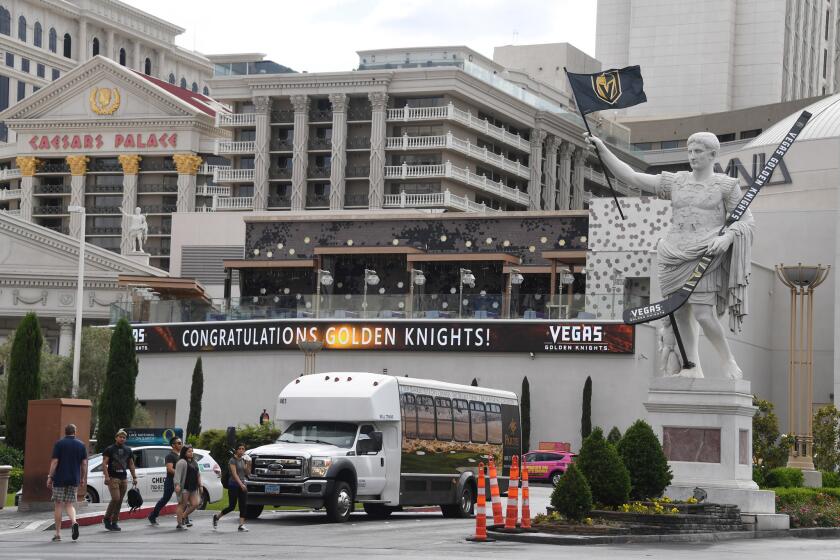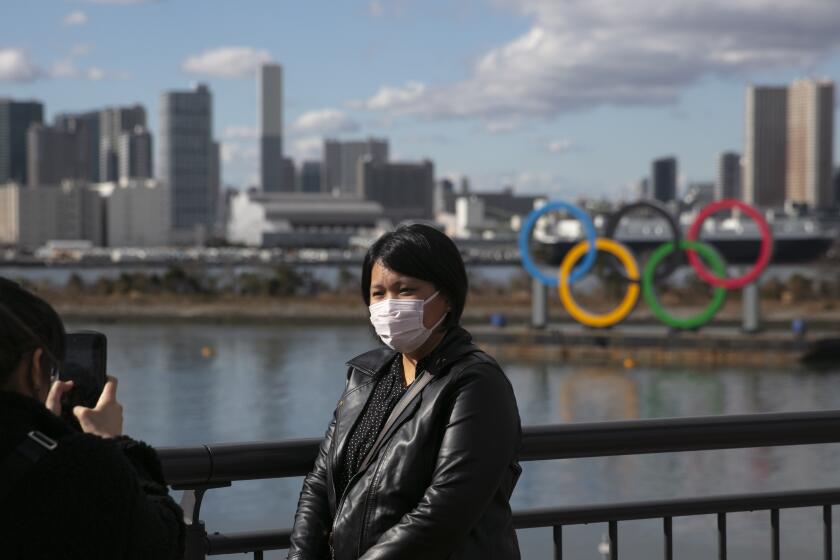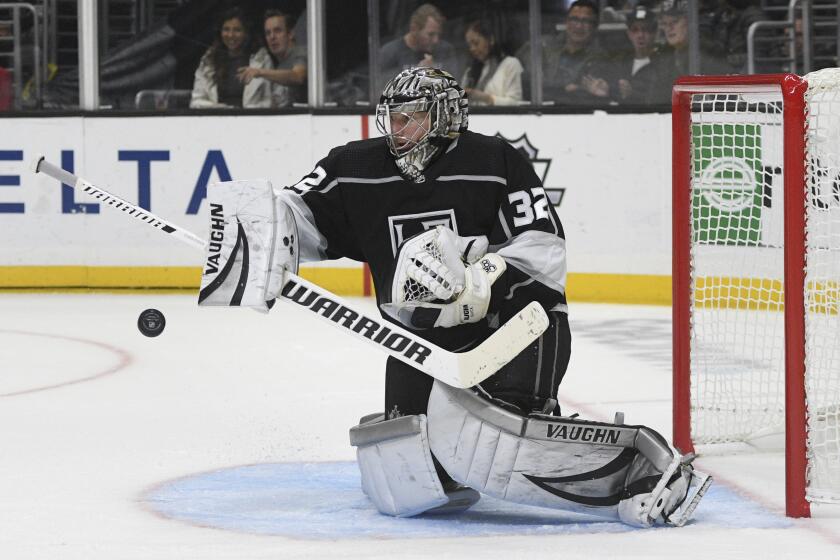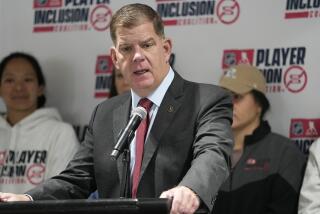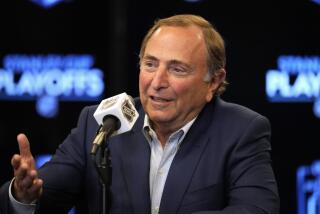Column: Stanley Cup playoffs in the summer? NHL has a lot on the line to finish the season
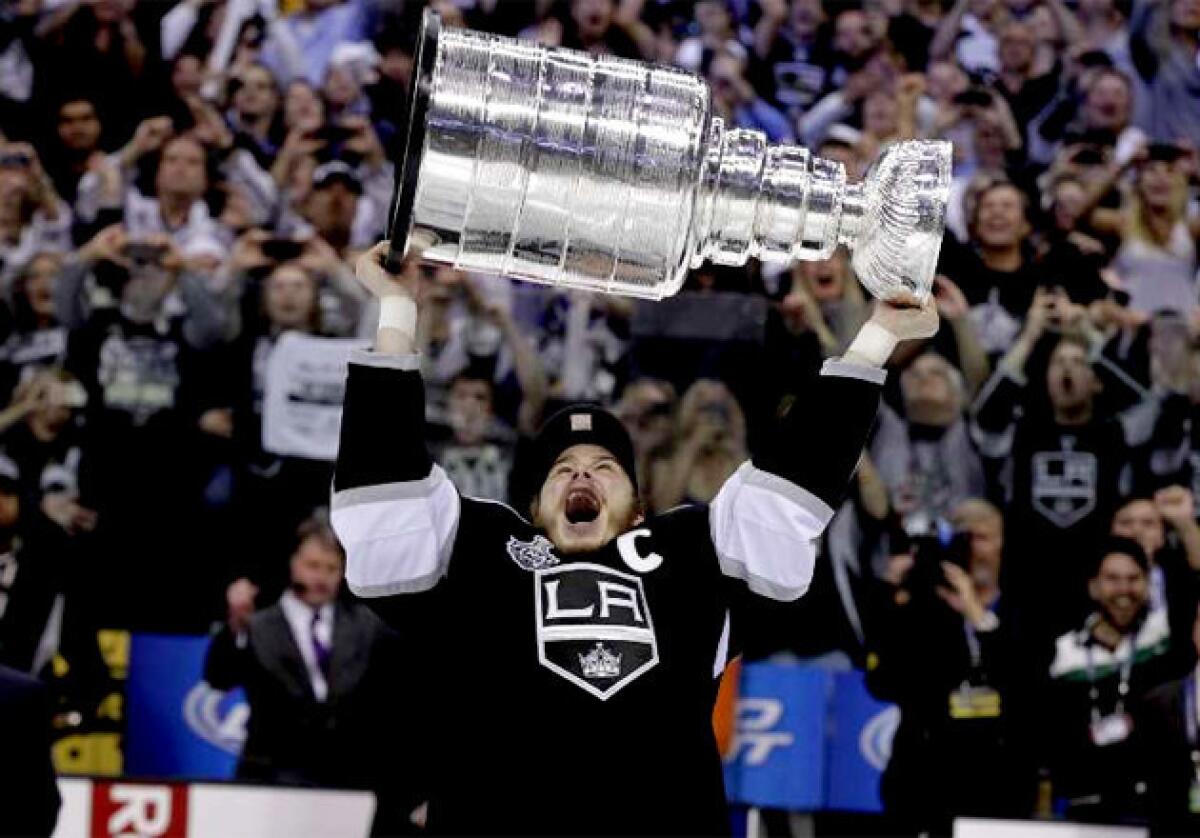
First in a series of articles about the 2020 futures of major sports leagues.
August is always the quietest month of the year for the NHL. After the free-agent frenzy fades and before the first skates hit the ice at training camp, Canadian players and executives retreat to their lakeside cottages and everyone takes a holiday from concerns about salary caps and Corsi numbers.
Those August reveries could be interrupted this year by the Stanley Cup playoffs if health authorities in the U.S. and Canada declare it safe for the league to end the pause Commissioner Gary Bettman imposed on March 12 in response to the COVID-19 outbreak.
Scenarios change from day to day and week to week — and it’s unclear whether fans would be allowed to attend — but Bettman repeatedly has said he’s open to scheduling games deep into the summer.
“And I’ve even heard a willingness to play into October to finish the season and have a declared Stanley Cup winner,” said Allan Walsh, co-managing director of Octagon Hockey.
The NHL has too much at stake to scrap the season before it evaluates every potential option. Its revenues, projected to hit $5 billion, will stall at $3.9 billion without additional games and playoffs. That shortfall will squeeze many franchises. In addition, its chances of landing the multi-network TV contract it hoped for starting with the 2021-22 season could be damaged the longer it’s away.
Arizona, Carolina, Dallas, Florida and Ottawa are the NHL teams that could be hurt the most because of the league shutdown caused by the COVID-19 pandemic.
“There’s two components to this, assuming health and safety are first,” said Pat Brisson, co-head of the hockey division at Creative Artists Agency. “There’s revenues, and then momentum to the game. Out of sight, out of mind. But if you have some sort of format, even if it’s July and August, and you can generate revenues and create some momentum back it would be outstanding.”
Completing the season would generate about $450 million in revenue, no small sum for the league.
“I think the NHL is more vulnerable to what’s going on in the world right now as opposed to any other pro league because the NHL is still largely a gate-driven league,” Walsh said. “If you break down and analyze hockey-related revenues, HRR, you’d find that the actual revenue generated from season tickets, the corporate boxes and luxury suites and all the ancillary revenue deriving from the gate like food and beverage, parking, in-arena signage and sponsorship and so forth is all directly tied in to people coming to the games in some form.
A series examining the challenges major sports leagues, teams and athletes are facing amid the COVID-19 pandemic.
“And when you compare that to the other leagues with much more lucrative broadcast rights deals, you see that the NBA went from a gate-driven league, like the NHL, 10, 12 years ago, to now with the NBA’s monster TV deals, they can play games in empty arenas with no fans and they will take a hit but they will not take the same kind of hit as the NHL will.”
Money is always a key motivator, but this is unknown territory. There were no health concerns for fans or players when Bettman lifted the lockouts he enacted in 1994, 2004, and 2012. There are now. In addition, people with underlying medical conditions are at high risk of becoming severely ill with COVID-19, which would affect several players: Montreal’s Max Domi and the New York Rangers’ Kaapo Kakko have Type 1 diabetes, and Arizona’s Phil Kessel and Florida’s Brian Boyle have overcome cancer. Other players might have similar histories they haven’t made public.
Neal Pilson, a former head of CBS Sports who runs a sports TV consulting company, said he’s sure Bettman’s primary concern is safety. But he also knows that some factors are beyond Bettman’s control.
When competitions resume post-coronavirus quarantine, fans will celebrate the simple fact they can sit next to strangers and cheer as one.
“Gary can wave his wand and they can start playing in protected locations with quarantined players and go to cities or areas where there’s a very low incidence,” Pilson said, “and the problem is you can go to a city that has a low rate of infection but you’re bringing in people from all over North America and Europe to play and that’s a risk that we’re all aware of. ...
“It’s not just lives at stake: It’s lives and deaths. You can be held responsible as commissioner if you bring a team back and the locker room is infected and a member of the team — or not even a team member, the locker room boy who changes the towels — gets sick. It’s an extremely difficult and very expensive decision.”
Bettman told Canada’s Sportsnet network last week if the NHL and players find a way to finish the season “on some basis that is fair and has integrity,” hockey will become a summer sport this year. “If we can’t do ideal, if we can’t do perfect, we’re going to have to figure out what’s next to perfect,” he said.
Brisson said the league and the NHL Players’ Assn. are working together closely, which hasn’t always happened. “It’s pretty clear the league and the PA will do everything in their power to make something happen somehow, even if we’re pushing the 20-21 campaign to a later start,” Brisson said.
NHL players and staffers are under a stay-at-home directive through Thursday. When it’s safe to ease that restriction, the first step would be to hold small-group workouts followed by team workouts and a three-week training camp. Bettman last week said one option would be to send teams to two or four “hub” cities to train and compete. Still undecided is whether the remaining 15% of the regular season will be played or whether play would resume with a traditional or revised playoff format.
The head of Japan’s medical association said it would be difficult to hold the Tokyo Olympics even in 2021 without a coronavirus vaccine.
“I do know that there’s been talk of playing summarized series, like instead of best-of-seven it’s best-of-five or best-of three,” said Allain Roy, head of the Roy Sports Group in St. Louis. “I’ve heard Vegas is up there [as a hub], Edmonton, Columbus, Toronto. A lot of different sites. I would assume there’s going to be some testing that can happen rather quickly so everybody involved would have to be tested before they quarantine into a hotel and an arena and then probably be tested every time they leave and come back into the sealed environment.”
That’s neither ideal nor foolproof. Someone will break that bubble — a player, hotel employee, bus driver, cook. And if a player tested positive for COVID-19 he’d have to be quarantined — as would everyone he sat with or checked — and that would put things on hold again.
That’s one of many hurdles Bettman is carefully contemplating.
“Clearly we can play next season, which we intend to do in its entirety, starting later,” Bettman said, “and so with a lot of timing options we have a great deal of flexibility and we’re not going to rush anything.”
At some point, though, the calendar will become a factor.
“To make a decision to play in July, you literally have to make that call within the next few weeks,” Pilson said. “I don’t know if Gary or Adam [Silver, the NBA commissioner] are going to be comfortable starting the parade so early with so much uncertainty still around the country and around the world.”
Walsh said the NHL’s eagerness to resume play is tied to the next TV contract.
“It’s critical to the new rights deal negotiations to finish up this season and have that experience on TV,” he said. “Along with the fact that with the Olympics postponed at least a year, NBC and NBC Sports has a wide-open schedule where hockey would be a natural fit right in there, if there are games being played.”
Kings goalie Jonathan Quick knows it takes some time to regain his form after a long break. He says NHL goalies will be tested if the season resumes.
Pilson called the NHL “good product. It has a loyal fan base,” adding that sports-starved fans are likely to watch in big numbers. But with unemployment in the U.S. topping 26 million, fans’ spending habits are likely to change.
“The NHL will be caught up ... in this tremendous uncertainty that currently exists with respect to the economy,” Pilson said. “And until we get a better sense of where the public is, sponsors are going to be reluctant to commit, make big investments, and the networks and television companies are going to be looking to see if the marketplace is back to where it used to be. I think most of us feel that’s not going to happen very quickly.”
If fans aren’t permitted in arenas and can’t afford to buy cars and products advertised on TV, Roy suggested the NHL supplement its revenues by asking state and federal officials to modify gambling laws to permit off-site and in-game betting.
“Maybe let fans be a part of it in that sense, where they can’t be at the game but if they want to gamble on the game, they can,” he said. “This is where we have to start thinking outside the box.”
Another thorny issue is whether to keep the draft in June or wait until after the season, which might delay it until September or later. That aspect of enormous uncertainty the NHL faces hit home for Brisson, whose son Brendan is draft-eligible this year.
“It is a little different,” Brisson said. “I guess we’re just lucky to have a son in the draft. At the end of the day, it will be what it will be.”
True enough, for him and for the NHL.
Times staff writer Jack Harris contributed to this story.
More to Read
Go beyond the scoreboard
Get the latest on L.A.'s teams in the daily Sports Report newsletter.
You may occasionally receive promotional content from the Los Angeles Times.

